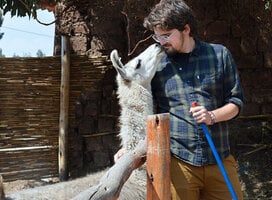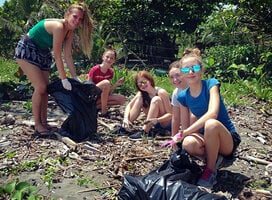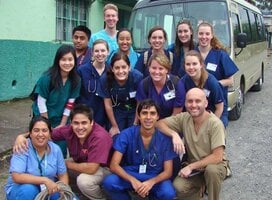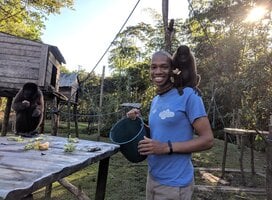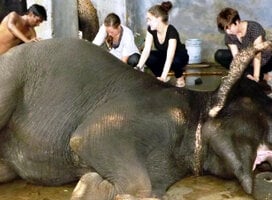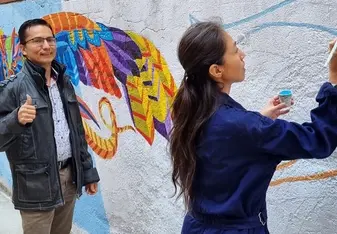Veterinary Service Volunteer Abroad Programs
Working with animals as a veterinary volunteer can be an excellent way to see the world and really make a difference in animal welfare and local communities abroad. Plus, veterinary school is now more competitive than ever, and if that's the direction you're heading, having volunteer experience abroad can make your resume stand out among your peers.
However, you don't have to have a career or a background in veterinary medicine. You may have studied marine biology in school, volunteered at a zoo, or worked as a conservation professional. Veterinary service volunteer programs come in all shapes, sizes, and skill sets! One can work to protect sea turtles in Guatemala, help rehabilitate flying foxes in Australia, or vaccinate street dogs in Nepal.
Everyone from fully licensed veterinarians and vet techs/nurses to passionate animal lovers can find opportunities to volunteer abroad and work with some of the world’s most vulnerable creatures. Read on for our in-depth guide on where to volunteer, what programs are available, and how to start planning your veterinary volunteer trip abroad.
There are various ways to become involved in veterinary services overseas. In many cases, one does not need to be a licensed veterinarian to participate in programs. Enthusiasm and love for fellow creatures is enough.
Street Animals:
One of the most popular types of programs is working with street animals, usually dogs. Several well-established shelters or local organizations welcome volunteers to help care for the animals.
The shelters provide basic services, such as spaying and neutering, vaccines, and first aid. Working with these animals is a rewarding experience and one that makes a real difference to the animals and to the community.
Veterinary Volunteering:
For those who do have a veterinary medicine skill set, there are many exciting opportunities. It is possible to travel around the world, offering services and learning about the local people, culture, and medicine. Work with dogs, cats, horses, birds, horses, and other animals and provide indispensable services in areas of need.
Wildlife Volunteering:
Working with animals in the wild can be a dream come true. Many programs are designed to combine veterinary services and conservation. Work in a safari park in Africa and learn about wildlife management, volunteer with elephants in Thailand, or rehabilitate penguins, cheetahs, lions, primates, or dolphins.
Animals face challenges and threats all over the world. Whether it’s a street dog savaging for its next meal or a sea turtle requiring careful rehabilitation, the need is great. Veterinary service volunteer opportunities can take you to far-flung, exotic locales, fascinating places with diverse cultures and welcoming people.
Southeast Asia:
Southeast Asia is one of the most well-established sites for volunteer programs. Here you will find opportunities to work with animals from street dogs to elephants. Conservation is an increasingly important aspect of tourism and culture in this part of the world, which creates great opportunities for adventurous volunteers.
Oceania
The South Pacific is made up of thousands of islands, making it a great place for veterinary volunteers to work with marine wildlife. Australia is also part of Oceania, where you can work at the Great Barrier Reef with turtles, or inland with endemic species like kangaroos and koalas.
Africa:
Africa is a fascinating destination on all levels. For those interested in wildlife conservation, management, and care, there is no better place to be. South Africa, especially, has a number of well-respected programs that allow volunteers to come and work with endangered animals.
Learning about wildlife in their native habitat is a dream for most animal lovers. For those who want more than just a photographic safari, consider a volunteer program where you can work with elephants in Botswana or Namibia or dolphins in Tanzania.
Both those with veterinary skills and those who merely have enthusiasm are welcome and encouraged to participate in programs of varying length.
Central America:
Central America is quickly becoming a hot spot for eco-adventures and eco-tourism. There are amazing opportunities to get up close and personal with the local fauna.
Several programs, including those in Guatemala and Costa Rica, allow volunteers to take an active role in protecting, conserving, and rehabilitating sea turtles, one of the most vulnerable species in the region.
Often, the best volunteer experiences overseas are in the developing world. Here, animal welfare may be a priority and concern, but the local people and governments do not have the resources to offer the necessary services. These are places where you can make a real and lasting difference to both the animals and the community.
In addition to deciding the skills you have to contribute, the wildlife population you want to help, and the location, there are a few other things to keep in mind when choosing to volunteer abroad. One of the most important things when choosing your veterinary program is to make sure it’s with a responsible and ethical organization that’s not only helping the animals but also the local community. For example, since most volunteer programs have fees, look for how the organization is using the money to help animals and their veterinary volunteers.
Veterinary Service Volunteer Programs Abroad
Pagination
What People Are Saying
Related Volunteer Abroad Articles
Frequently Asked Questions
-
Where can I volunteer to help dogs abroad?
You can volunteer with dogs abroad in shelters or by shadowing a vet at a clinic. A few places to consider working with street animals abroad include Argentina, Nepal, and Thailand.
-
Where can I volunteer abroad as a vet?
There are animals in need around the world, however, some of the most popular destinations to volunteer as a vet include Southeast Asia, Africa, Oceania, and Central America.
-
What do veterinary volunteers do?
It depends on your skillset and the animal population you're working with, but many veterinary volunteers help with wildlife research, providing first-aid, administering vaccines, feeding animals, and cleaning living spaces.


